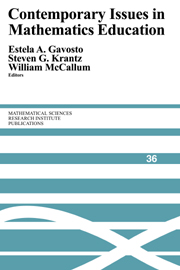Book contents
Reports from the Working Groups
Published online by Cambridge University Press: 27 June 2025
Summary
How the Working Groups Worked
The participants of the conference were divided into small working groups in the afternoons, each charged with a different topic. The task of each working group was to come up with a coherent, concise report on its deliberations, with concrete recommendations on how to improve mathematics education with respect to its topic.
Before meeting each day, participants in each working group were asked to fill out a questionnaire on their topic for the day; the answers provided the basis for that day's discussion. The group's reporter collected the questionnaires at the end of the conference.
Each group had a discussion leader and a reporter. The discussion leader's job was to keep the group working and on track. The reporter's job was to take notes, to collect the questionnaires, and to write up the final report.
The final report divides roughly into two parts, one for each day: (1) a summary of previous activities of the working group members, with an assessment of successes and failures; and (2) recommended goals and strategies to achieve those goals.
It was neither necessary nor possible in all cases that the group come to a consensus. Nor was it possible to avoid speculation and uncertainty. However, each group was advised to make its best effort at finding areas of common purpose, and recommending specific strategies.
Information
- Type
- Chapter
- Information
- Publisher: Cambridge University PressPrint publication year: 1999
